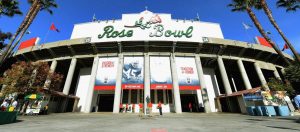City Of Pasadena Prevails In Thorny Rose Bowl Trademark Dispute
This ruling may serve as an important decision in the context of sports-related trademark usage but has a much broader meaning as well.
 The trademark lawsuit that was supposed to be the granddaddy of them all ended up lasting merely five months before a federal judge pulled the plug. On July 12, 2021, Judge Andre Birotte Jr. in the U.S. Central District of California granted the City of Pasadena’s motion to dismiss the Pasadena Tournament of Roses Association’s complaint with prejudice, indicating that leave to amend would be futile.
The trademark lawsuit that was supposed to be the granddaddy of them all ended up lasting merely five months before a federal judge pulled the plug. On July 12, 2021, Judge Andre Birotte Jr. in the U.S. Central District of California granted the City of Pasadena’s motion to dismiss the Pasadena Tournament of Roses Association’s complaint with prejudice, indicating that leave to amend would be futile.
The Association, which has hosted the world-famous Rose Parade and Rose Bowl Game, is the exclusive owner of the Rose Bowl Game trademark. It was upset when the City of Pasadena allegedly disseminated false claims concerning the ownership of the Rose Bowl Game and its related intellectual property. The issue arose based on the use of the Rose Bowl trademark in an Instagram post published on the Rose Bowl Stadium’s official Instagram account.
The City of Pasadena did not dispute that the Association owned a valid mark and that the City of Pasadena used the mark in commerce. Instead, it focused on whether its use was likely to confuse and, in its motion to dismiss, it argued that its use of the trademark on social media should be considered nominative fair use and that it was an expressive work protected by the First Amendment.

Is The Future Of Law Distributed? Lessons From The Tech Adoption Curve
Citing California federal precedent, the court noted that “where a defendant uses a trademark to describe plaintiff’s product rather than its own product, that defendant is entitled to the nominative fair use defense” and that such a defense is appropriate in the “class of cases where the use of the trademark does not attempt to capitalize on consumer confusion or to appropriate the cachet of one product for a different one.”
Such nominative use of a mark — where the only word reasonably available to describe a particular thing is pressed into service — lies outside the strictures of trademark law: Because it does not implicate the source identification function that is the purpose of trademark, it does not constitute unfair competition; such use is fair because it does not imply sponsorship or endorsement by the trademark holder.
The court tasked the City of Pasadena with satisfying three factors: (1) the product or service in question was not one readily identifiable without use of the trademark; (2) only so much of the Rose Bowl mark was used as reasonably necessary to identify the product or service; and (3) it did nothing that would, in conjunction with the Rose Bowl mark, suggest sponsorship or endorsement by the Association. It was the burden of the Association to establish that the City of Pasedena’s use of the mark was not a nominative fair use.
First, the court agreed that the Rose Bowl Game is not readily identifiable without using the term Rose Bowl. The court mentioned that the City of Pasadena could have called it the “game played on New Year’s Day in Pasadena” but had no need to vaguely describe the mark as opposed to using the trademark itself. That brought to mind the NFL’s vigilant enforcement of its Super Bowl trademark and the resultant use of the “Big Game” by many third parties. Perhaps this ruling could cause those third parties to reconsider, depending on how the Super Bowl trademark is to be used.
Sponsored

Is The Future Of Law Distributed? Lessons From The Tech Adoption Curve

Early Adopters Of Legal AI Gaining Competitive Edge In Marketplace

The Business Case For AI At Your Law Firm


Legal AI: 3 Steps Law Firms Should Take Now
Second, the court found that the City of Pasedena only used so much of the mark as reasonably necessary to identify the game, using the term Rose Bowl twice, and the Association failed to provide any support to suggest that using the mark twice was per se unreasonable.
Third, the court could not find substantiation for how the City of Pasedena’s use does anything to suggest association or sponsorship by the Association. No express or implied language of sponsorship or endorsement was included on the Instagram post. Interestingly, the court even noted that the City of Pasedena failed to “tag” the Association’s accounts, indicating that such tagging could play a role in a consumer believing that the content implied endorsement.
This ruling may serve as an important decision in the context of sports-related trademark usage but has a much broader meaning as well. If a defendant can establish the elements of nominative fair use, then the burden-shifting to the plaintiff to prove otherwise seems to be quite daunting.
Darren Heitner is the founder of Heitner Legal. He is the author of How to Play the Game: What Every Sports Attorney Needs to Know, published by the American Bar Association, and is an adjunct professor at the University of Florida Levin College of Law. You can reach him by email at heitner@gmail.com and follow him on Twitter at @DarrenHeitner.
Sponsored

Navigating Financial Success by Avoiding Common Pitfalls and Maximizing Firm Performance








